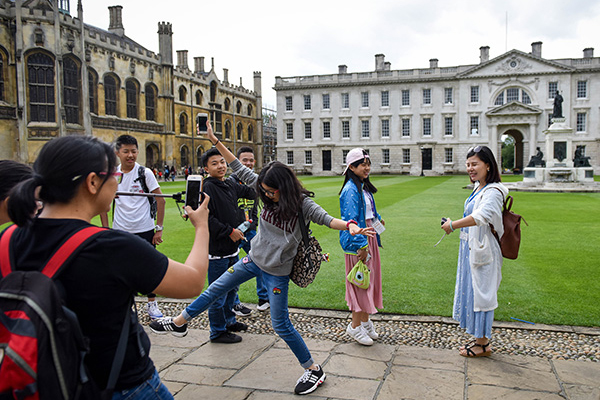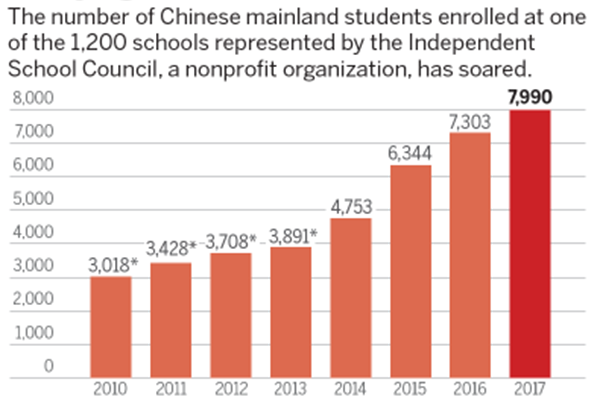More Chinese students summer at UK schools
China daily | Updated: 2017-08-14

When Chinese parents first sent their children to the UK for summer camps and courses, the kids stayed with host families and attended standard language schools. Now, some of the UK's most celebrated private schools are competing to attract Chinese children to their summer programs.
As the number and sophistication of Chinese customers has increased, so have their requirements. Most parents are looking for quality courses at a well-known school with on-site accommodations. Parents also are willing to send their children abroad at a younger age.
English language skills in China have improved in schools, leading to more Chinese parents considering enrolling their children in specialized summer courses or specific skill-development classes.
"Many young people in China want to ensure that their academic performances are supported by training in the personal qualities that will make them excel in the multinational workplace of the future," said Alexander Nikitich, founder of Carfax Education Group.
As a result, the group receives more requests from students who want to use the summer to develop their skills in areas such as interview training, presentation making, English language for math and sciences and career planning.
Talent development at summer camp is increasingly popular among Chinese students. "We had a student who has been the national math competition prize winner, and a student with a desire and ability to sing opera," said Nikitich, who has worked in the industry for over 20 years.
The demand from Chinese families has grown so much in recent years that Carfax opened a dedicated Chinese desk three years ago operated by UK-based Chinese-speaking education consultants.
Nikitich said Chinese participants in his school program come from very rich families, the majority of whom are from Shanghai, Beijing and Shenzhen, but this year clients also come from other parts of China, such as Chengdu, Wuhan and Xiamen.
The recent trend also indicates that students who take part in overseas summer camps are getting younger as their parents are eager to equip them for further studies and potential emigration in the future.

Many Chinese families are considering UK schools or universities as an option for their child's education and the summer programs offer them an introduction to the country, its people and culture-and education system.
Pundits said it is in some ways a try-before-you-buy experience, although summer courses and summer schools are not the same as regular school.
"Chinese parents, in particular, are very detail focused and require maximum information about the program before they make a decision. Price is not necessarily the key deciding factor, but location, safety, nationality mix and the responsiveness of our staff to answer queries are of vital importance," said Greg Patton, director of sales and marketing at Bell English, which has been running young learner camps since 1986.
William Vanbergen, the founder of Shanghai-based BE Education, an organization that helps Chinese students gain entry to elite UK schools, said most parents ultimately have in mind some type of study abroad for their children.
"Summer courses help prepare for study abroad by providing a 'British school life' experience, boosting English levels dramatically, and allowing students to become more culturally aware," said Vanbergen, who found that many students return from summer courses with a stronger motivation to study English and a greater appreciation for overseas teaching methods.
For many students, Vanbergen said, a residential summer course is the first time students really are allowed to exercise their independence and are asked to be self-reliant, which are two essential skills to successfully study abroad.
According to the Independent School Council, a nonprofit organization representing more than 1,200 schools, the number of Chinese students this year who have parents living overseas increased by nearly 115 percent compared with five years ago, when there were 3,708.
China remains the top source of overseas pupils in the UK with 7,990 Chinese students in British schools. Of those, 1,328 Chinese students have parents living in Britain while they study, according to the 2017 ISC census report.
The UK Higher Education Statistics Agency reports that in 2015-16, the number of students from China far exceeded any other nationality, at 91,215, making up 32 percent of the non-EU students in the UK.
Summer courses offered at British boarding schools are particularly appealing to Chinese parents due to its rich history and high profile, said Vanbergen, who has been working with top British schools on summer camps for over a decade.
The Eton College summer course was originally designed for only 40 boys ages 13 to 17 years old and has been expanded to 160 places for boys and girls. BE Education has since designed a course at Charterhouse for young learners (ages 8 to 12) who are keen to experience boarding life and learning at a top school.
Vanbergen said that the company now sends over 300 Chinese students on summer and winter camps each year around the globe. The average price for the UK courses, is about 64,000 yuan ($9,520) for three weeks and 59,800 for 2 weeks, higher than a regular study tour, he said.
Xiao Juan, who sent her son, Peng Yuantian, to the Charterhouse summer program, said the experience helped him learn how to manage himself, his studies and his daily life.
"Through the experience, my son was aware that not everyone would like or tolerate him and there might be some people he disliked. He learned to be more polite and patient with others," Xiao said.
Peng, 12, said he was happy to have such an experience without his parents, although he missed them and cried in the early days of the trip.
"I picked up the feeling of English learning and felt the English writing was not so difficult as I imagined. And I was happy that I could have a role in a drama show and proud that I could get a prize," Peng said.
Safety is the top concern for parents who send their children overseas.
Last month, Wang Bin, 18, was found dead in Washington state after he went missing from a US youth summer camp.
Wang, believed to be a high school student in China, was attending a Christian summer camp as part of a longer US trip.
Tim Fish, director of Earlscliffe, an independent British college that provides summer programs to international boys and girls age 8 to 17, said students' safety is the top priority.
"We have all our trips and activities supervised. Students do not leave the campus unaccompanied, and risk assessments are completed for all activities, events and trips," Fish said.
Susan Hamlyn, director of the Good Schools Guide Advice Service, said she expects the trend will continue to grow in the UK as English boarding schools offer something unique.
"There are now very few boarding schools which are not used by language schools in the holidays, but the danger will be that there are more Chinese children wanting to come than there are places for them, so parents need to be sure that they are choosing a reputable school," Hamlyn said.

Most Chinese 9-year-olds spend their summer close to home under the supervision of parents or grandparents, but Qin Chen spent part of the holiday improving his basketball skills at a summer school in Barcelona, Spain.
Qin, who prefers to be called Marco, had practiced basketball for a year at a local club in Hangzhou, Zhejiang province, but was keen to improve so he joined five other Chinese schoolchildren for a weeklong summer camp at the Audie Norris Basketball Camp-away from his parents-to pursue his favorite hobby.
The annual camp was set up by retired NBA basketball player Audie Norris, who also played in Spain and served as head coach of the Chinese team in the Jump 10 Elite Training Camp in 2016.
Marco said he was selected to be the coach's assistant because he could speak English and translate for those who could not understand the language well.
"The training was very hard, and I was tired every day. But I am very proud that all of us finished the training," Marco said, adding that he learned a lot from the older boys but felt he was still far behind. He made a lot of friends, and regrets not asking for their contact details.
The program was initially suggested by Marco's training club coach, Chavi, a former player in the Spanish Basketball Clubs Association league.
According to Wu Yiping, Marco's mother, "Chavi knows all about the camp, as he was invited as the guest speaker to share his experience with the campers last year. We believed in him and trusted his choice."
The basketball camp costs 10,000 yuan ($1,500) per week, including food and lodging, which Wu said was reasonable. She traveled to Spain with her son but did not attend the camp. She believes her choice to send her son to the camp is a good example for Chinese families more focused on talent development than on language immersion.
Wu said she wanted Marco to have the experience of living abroad, which was a key factor in her decision.
"I was really interested to see what my son could do in a totally foreign environment, to test his independence and interdependence, and to learn to trust him being on his own," she said.
The children had to travel two metro stops between the training center and their living quarters every day, which Wu said was her biggest concern.
"I worried about what would happen if they got separated from the coach and got lost on the way to training," she said.
Wu said the experience was as educational for parents as it was for the children: "I have discovered the strength and potential of my kid, and have learned to stay calm and allow him to solve problems by himself."
She hopes Marco will be able to attend an international basketball camp in China.
Globalization should not just mean us traveling abroad, but also others coming to China," she said.
Source: http://www.chinadaily.com.cn/china/2017-08/14/content_30571826.htm